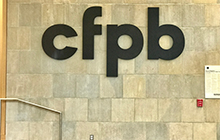 On January 11, 2023 the Consumer Financial Protection Bureau (CFPB) proposed a rule (“Proposed Rule”) that would require “most nonbanks subject to the Bureau’s supervisory authority” to “register annually in [a] system” that is created and operated by the CFPB when their form contracts “use certain terms or conditions that seek to waive consumer rights or other legal protections or limit the ability of consumers to enforce or exercise their rights.” Proposed Rule at 3. As stated in the CFPB’s press release, such “nonbanks subject to CFPB supervisory jurisdiction” include “those operating in payday lending, private student loan origination, and mortgage lending and servicing,” as well as those “operating in student loan servicing, automobile financing, consumer reporting, consumer debt collection, and international remittances.” With the Proposed Rule, the CFPB continues its recent trend of proposing to establish registries requiring nonbanks to regularly report information to the CFPB to enable its own oversight and invite public scrutiny.
On January 11, 2023 the Consumer Financial Protection Bureau (CFPB) proposed a rule (“Proposed Rule”) that would require “most nonbanks subject to the Bureau’s supervisory authority” to “register annually in [a] system” that is created and operated by the CFPB when their form contracts “use certain terms or conditions that seek to waive consumer rights or other legal protections or limit the ability of consumers to enforce or exercise their rights.” Proposed Rule at 3. As stated in the CFPB’s press release, such “nonbanks subject to CFPB supervisory jurisdiction” include “those operating in payday lending, private student loan origination, and mortgage lending and servicing,” as well as those “operating in student loan servicing, automobile financing, consumer reporting, consumer debt collection, and international remittances.” With the Proposed Rule, the CFPB continues its recent trend of proposing to establish registries requiring nonbanks to regularly report information to the CFPB to enable its own oversight and invite public scrutiny.
According to the press release on the Proposed Rule, “[i]n some cases, terms and conditions in non-negotiable form contracts mislead consumers into believing the terms or conditions are legally enforceable.” The Proposed Rule would require supervised nonbanks to register the following types of terms and conditions, which purportedly fall within that description: “waivers of claims a consumer can bring in a legal action; limits on the company’s liability to a consumer; limits on the consumer’s ability to bring a legal action by dictating the time frame, forum, or venue for a consumer to bring a legal action; limits on the ability of a consumer to bring or participate in collective legal actions such as class actions; limits on the ability of the consumer to complain or post reviews; certain other waivers of consumer rights or other legal protections; and arbitration agreements.” Proposed Rule at 4. According to the CFPB, use of these terms in particular warrants public registration because, “[c]onsistent with the risks to consumers posed by covered terms and conditions . . ., Congress, States, the courts, the Bureau, the Federal Trade Commission (FTC), and other governmental bodies periodically have restricted their use in some contexts.” Id.
The CFPB has stated that the Proposed Rule is necessary “to facilitate the Bureau’s market monitoring functions and its risk-based supervisory processes,” and “facilitate public awareness and oversight by other regulators of the use of covered terms and conditions.” Proposed Rule at 5. Its commentary to the Proposed Rule suggests that it would “bring an enforcement action” or require payment of “penalties for non-compliance.” Proposed Rule at 150-51.
